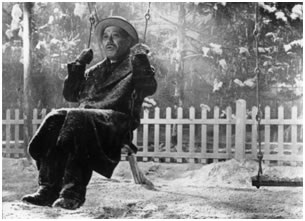February 4 / 5
- “The Nature of Film Translation: Literal, Traditional, and Radical” (first five pages). This text serves as an introduction to our course.
- Here is a very informative video on Philip K. Dick. It includes a short section on "Minority Report."
- Start reading Philip K. Dick's Minority Report
- Movie: Minority Report -- (2002, Steven Spielberg, Director)
- Read the review in the New York Times and another one by Roger Ebert.
February 11 / 13
- Continue movie: Minority Report
- A Law Professor on "Minority Report" (text and film)
February 18 / 20
- Finish discussion of text/film Minority Report
- Read: "The Language of Film and Its Relation to the Language of Literature"
- Start reading William Faulkner's Tomorrow
February 25 / 27
- Discussion Faulkner's Tomorrow
- We start watching Tomorrow (1971, Joseph Anthony, Director)
- Film review of Tomorrow
On February 27 we will meet
in the Library and not in our classroom
March 4 / 6
- Continue Tomorrow
- Finish discussion of text/movie Tomorrow
- Start reading The Girl on the Train
March 11 / 13
- Discussion of The Girl on the Train (novel)
- Movie: The Girl on the Train (2017, Tate Taylor, Director)
- npr book review
- npr film review
- New York Times book review
- Washington Post film review
- Roger Ebert film review
March 18 / 20
- Finish discussions on The Girl on the Train (text and movie)
- Start reading Silence by Shūsaku Endō.
- A video on Francis Xavier who was one of the first Jesuits visiting in Japan.
- This article provides the historical background of the history of Jesuits in Japan in the 16th and 17th century.
March 25 / 27
SPRING BREAK
April 1 / 3
- Movie: Silence (2016, Martin Sorcese, Director)
- Silence film review in The New Yorker
- Review in the New York Times
- New York Times Magazine report on Scorsese and his film Silence
April 8 / 10
- Continue movie: Silence
- Read: Cahir: "Novels and Novellas into Film ..."
April 15 / 17
"Silence" Review due April 17
- Start reading The Death of Ivan Ilyich by Leo Tolstoy
- We start watching Ikiru (1952, Akira Kurosawa, Director, Japan)
April 22 / 24
- Continue The Death of Ivan Ilyich (Tolstoy)
- Film review by Roger Ebert
April 29 / May 1
- Start reading It had to be Murder by Cornell Woolrich
May 6 / 8
- Background information about the movie
- Rear Window (1954, Alfred Hitchcock, Director)
May 13 / 15
- Continue: Rear Window (1954 Hitchcock)
- Here's a review focussing on the topic words vs. images
- Another interesting comparison of text vs. film
======================================
FFC Course Learning Outcomes
Students who take this course will
- be able to analyze literary texts
- be able to analyze films
- understand major aspects of the art of adaptation (literature to film)
- learn how to apply this knowledge to other literary works and films
FFC Program Learning Outcomes
- Provides students an introduction to university-level critical inquiry
- In discussions and written work, students frame critical questions about ideas, readings, visual materials, and other cultural texts.
- Students can critically reflect on their own thought traditions.
- Students understand that disciplines and intellectual traditions have histories.
- Students participate in academic exchanges, collaborative work, and/or co-curricular activities.
Chapman University’s Students with Disabilities Policy
In compliance with ADA guidelines, students who have any condition, either permanent or temporary, that might affect their ability to perform in this class are encouraged to contact the Office of Disability Services. If you will need to utilize your approved accommodations in this class, please follow the proper notification procedure for informing your professor(s). This notification process must occur more than a week before any accommodation can be utilized. Please contact Disability Services at (714) 516-4520 or (www.chapman.edu/students/student-health-services/disability-services) if you have questions regarding this procedure, or for information and to make an appointment to discuss and/or request potential accommodations based on documentation of your disability. Once formal approval of your need for an accommodation has been granted, you are encouraged to talk with your professor(s) about your accommodation options. The granting of any accommodation will not be retroactive and cannot jeopardize the academic standards or integrity of the course.
Important Note from the Dean of Students regarding absences“In some cases, your instructor may ask the Dean of Students Office for assistance in confirming a student’s circumstances with regards to a request to excuse an absence/absences. The office the Dean of Students will collect and review documentation from the student and then providing a recommendation to the professor for consideration. They only get involved if the student’s situation is sensitive and the documentation they collect is confidential. The Dean of Students Office staff will only consider requests for an excused absence in medical situations with a documented illness/diagnosis and/or a personal or family emergency. In these situations they will request supporting documentation to aid their review. The Dean of Students Office and staff as well as your instructor will not consider requests for an excused absence in the following situations: medical situation without a documented illness/diagnosis (notes from a medical provider confirming only that the student was seen on a particular day are not sufficient); retroactive requests (when the absence occurred more than a week earlier); and/or attendance conflicts related to a personal or family obligation (since these are not confidential, the professor can consider them without Dean of Students staff involvement). If a student has tested positive for COVID-19 or is feeling symptomatic, the student should email contacttracingteam@chapman.edu for appropriate guidance and next steps.”





